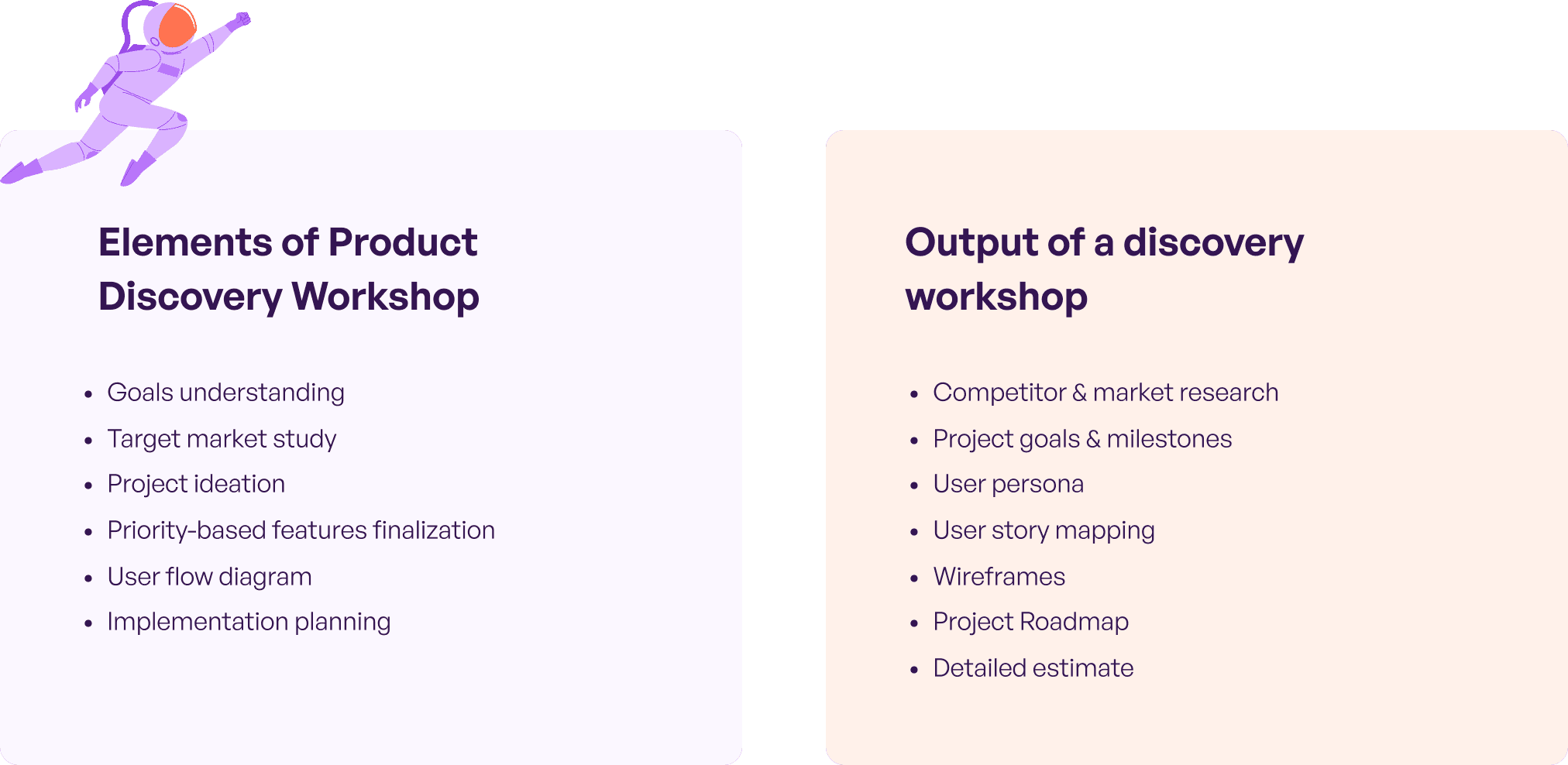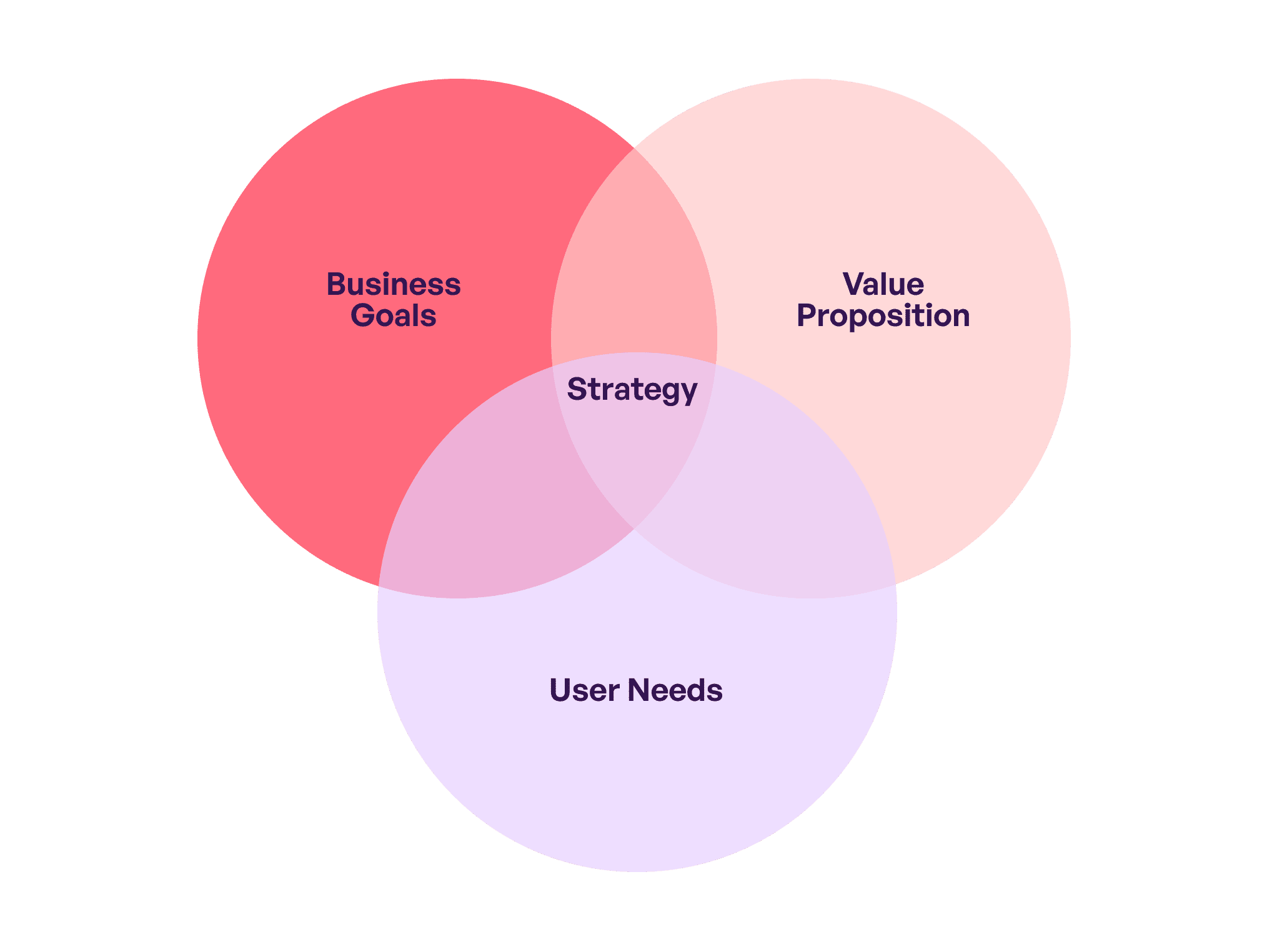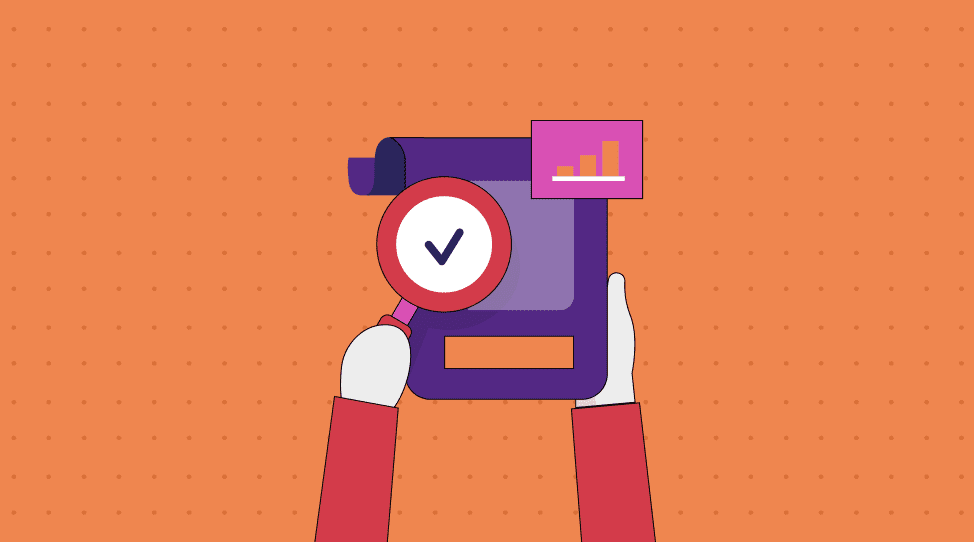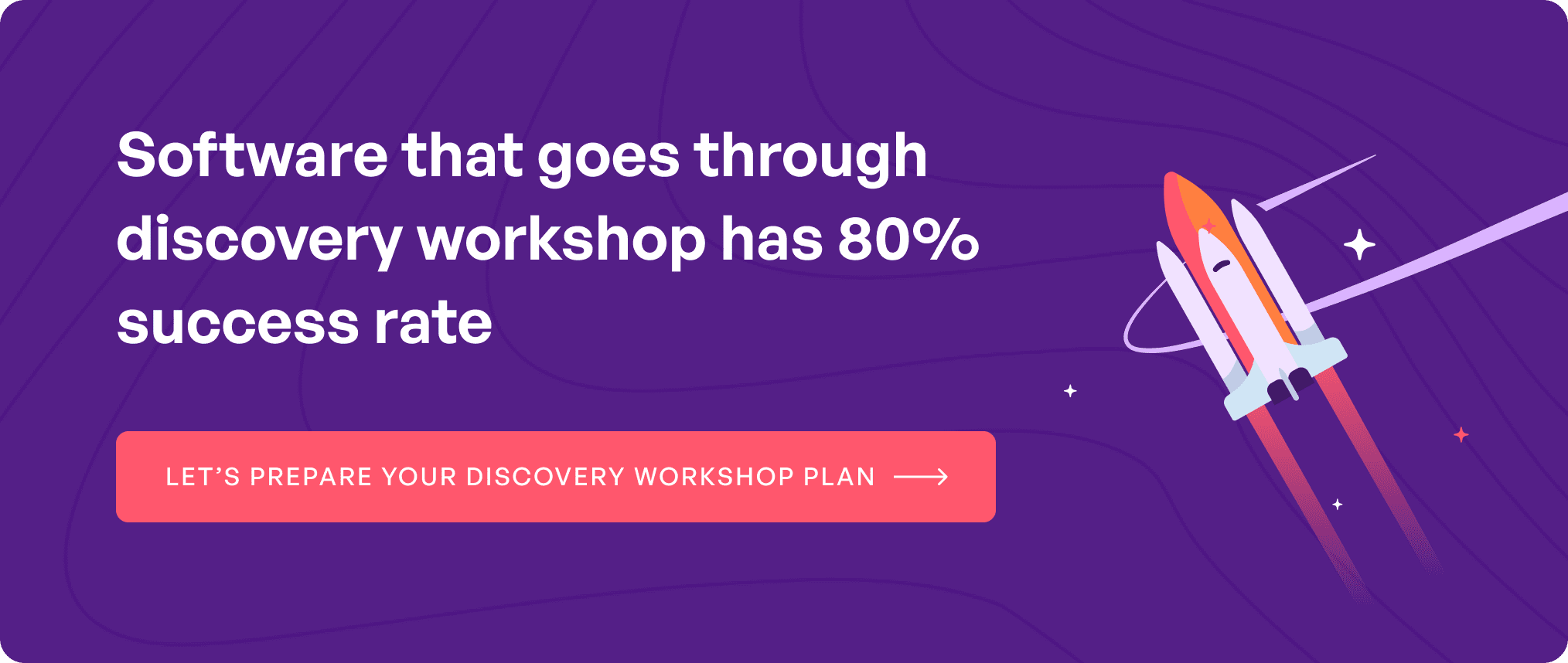Imagine starting a project without a discovery workshop.
We have yet to learn about the goal of the MVP. No context. Neither do we know that the app will later be connected to the patient’s database. Based on what little information we have, we create an estimation of 100 working hours.
Later on, to everybody’s surprise, the project will turn out to be extremely complex with multiple integrations and the working hours will increase to 500.
Discovery workshops help detect and reduce the possibility of stepping on such surprises by 90%.

In your research to find the best software development approach, chances are you would have come across ‘discovery workshop’ and by reading into the details of what a discovery workshop entails, you might think you don’t need it.
This article will convince you otherwise.
Table of contents
Who is the product discovery workshop for?
The purpose of a discovery workshop is different for different clients.
Clients who know what they want to build but don’t have an idea of how to achieve it or what to include in the project:
“I want to create an eCommerce app to sell and buy used clothes. The sellers will get coupons every time their clothes are sold, which they can use on other online platforms. The app should be easy to use and have a big list of items.” – (clear goals, undefined features)
Clients who have a clear idea of the app, but are stuck with too many features and ideas:
“I want to create an eCommerce app to sell and buy used clothes. There will be an AR/VR function to try on the clothes. AI will be used to tell customers what to buy and in which size. There will be a return feature where the users will be able to track the status on blockchain and get multiple options to get the money back – in the form of store credits, in-account, and cryptocurrency. I have a lot of ideas!” (no clear focus on main USP, features are well defined)
Clients planning for large-scale projects need estimates of deadlines and budget, work and timeline prioritization:
“I need to create a C2C eCommerce app for people to buy and sell used clothes. I have created the user flow and know what to expect in terms of interface and experience.” (everything is defined but lacks a milestone plan)
As you must have gathered, discovery sessions come in handy for every type of project, irrespective of where they are in the ideation stage. To emphasize this further, let us look into the negative impact that the lack of client discovery meetings brings.
Side-effects of not performing a product discovery workshop
The idea behind discovery workshop activities is to validate assumptions and ensure that the idea is development and market-ready. The absence of this extensive exercise can have several dire impacts.
Project cost underestimation
A software idea that looks simple on the surface might come with several complex functionalities and integrations on both frontend, backend levels. This is one of the main reasons why startups tend to abandon their project after starting the work thinking it would be easy to execute.
Discovery sessions give clients a detailed view of what would go into their application – functionalities, design systems, technologies, etc. – every element that plays a role in deciding the app development cost. This gives entrepreneurs clarity into the budget they will have to set aside.
Product abandonment post-deployment
This issue doesn’t occur when the product is being made for an enterprise’s internal users since the requirements, use cases, and intents are clear. Making an app for external users is a different ballgame though since there is limited information on what the user needs or how they would interact with the application. Discovery workshop questions help answer this.
The goal of a discovery session is to create user personas, build user stories, and get a detailed understanding of what the customers want and ways they will achieve the need. This level of detailed discussion helps with conceptualizing a product with end users’ seal of approval, even before it hits the development stage.
Missing critical functionalities
At times, in the race to attain the big picture, entrepreneurs tend to overlook the obvious. The benefits of discovery workshops for the client lie in the fact that businesses can create precise technical and functional documentation of their software.
Moreover, the software house you partner with can also help in verifying the critical functionalities which will be needed for revenue and end-user expectations front. To solidify this further, the creation and implementation of functionalities are reflected in the project schedule so that there is clarity about time in terms of both development and testing.
Lack of priority
When an entrepreneur starts a project, it feels that everything is critical. However limited money and time make it impossible to prioritize what is important, leading to a situation where the team might spend a lot of effort in building a low-priority item while rushing into building a high-priority task. Client discovery workshops help identify the MVP-level features that would directly impact conversions and usability.
This way, entrepreneurs can dedicate focused time and resources to planning key deliverables and efficient planning.
Now that we have looked into the different facets of the importance of discovery sessions through the lens of its lacking, let us be direct.
The benefits of discovery workshop people don’t talk about
In the last few years of conducting dedicated workshops, we have found evidence supporting the unprecedented importance of discovery sessions, both for us and our clients. Here are the ones that our clients single out as the most critical advantages.

Overall product idea gets improved
At Simublade, when we hold discovery workshops we intend to not just define the elements of the app we are creating but also increase its success rate. The way to achieve this is entirely dependent on the efforts we take in defining the target user base – people who will use the app once it’s launched in the market.
By knowing who will use the software, how they will use it, and the expectations they will have with the application, we define all the features and functionalities along with the core elements of the application. This helps us tailor the final product idea according to the users’ needs.
Production time and cost are lowered
The number and complexity of features tend to impact the production timeline and cost massively. When we sit with our clients, we have a detailed list of discovery workshop questions that helps split features into three sections – mandatory, nice to have, and unnecessary.
Usually, clients think they require a certain feature to make the app successful, without knowing that there can be an easier way to accomplish the task. The discovery workshop session shows them exactly what their users want to accomplish and the steps they will take to achieve it, which then defines the ultimate features and functionalities list. There have been several instances where the initial estimate was over 30-40% higher than the final estimate post-workshop.
Probability of encountering problems is minimized
Modifying ideas is much cheaper and simpler when it happens before the production stage. To avoid any surprise from creeping into the project at a later stage, we hold extremely detailed potential problem discussion rounds with our design and development team. Every feature that we plan to add is scrutinized under the problem lens to ensure that no issue is left unplanned.
The problem statements we lay out here ultimately help with –
- Resolve problems early on
- Minimize the chance of unexpected encounters during the production stage
- Ensure everything is in-budget
- Guarantee a market-ready digital solution
A clear roadmap and production plan are built
Another one of the key benefits of discovery workshop that our clients get is in terms of the paperwork they get post-workshop. They get a detailed production plan with everything discussed in the workshop along with detailed definitions of elements like – business ideas, design elements, the technologies which should be used, answers to issues, and individual project aspects.
Some critical documents that get delivered to our clients after the discovery workshop are –
- Product purpose
- User persona
- Detailed user flow
- Low fidelity wireframes
- Functional requirements and tech stack
- MVP definition
- Project roadmap.
These benefits are signs of why discovery workshop sessions work. But does every single application need this step in their software development lifecycle? The answer is no. We have worked on apps where having a discovery session just wouldn’t have made sense.
Here’s a summarized version of those instances –
- The application had standard functionalities or the objective of the solution and its features were clear.
- Clients already had what they needed to start – idea validation and thorough documentation
- Application was not getting built from scratch, small changes were needed to improve the already-existing software.
Frequently asked questions about discovery workshop sessions
Q. What is a client discovery session?
Ans. A client discovery session is a collaborative meeting between developers and clients to gather requirements, clarify objectives, and understand the scope of a project before commencing development.
Q. How do you prepare for a discovery workshop?
Ans. To prepare for a discovery workshop in software development, follow these steps:
- Define objectives: Clearly outline the goals and objectives of the workshop. Determine what information you need to gather from the client and what outcomes you aim to achieve.
- Identify participants: Determine who needs to be involved from both the client side and the development team. Ensure representation from key stakeholders, decision-makers, subject matter experts, and developers.
- Prepare materials: Create an agenda or workshop plan outlining the topics to be discussed, activities to be conducted, and the duration of each session. Prepare presentation materials, whiteboards, sticky notes, and any other tools needed for collaborative brainstorming.
- Develop questions: Prepare a set of open-ended questions to guide discussions and elicit valuable insights from the client. Tailor these questions to uncover requirements, user needs, pain points, and desired outcomes.
- Set expectations: Communicate the purpose and objectives of the workshop to participants in advance. Clarify the role of each participant, the expected level of engagement, and the importance of active participation.
- Stay flexible: Be prepared to adapt the agenda and discussion topics based on the flow of conversation, new insights, or unexpected issues that arise during the workshop.
Q. Do you need a discovery workshop?
Ans. It depends. If the application had standard functionalities or the objective of the solution and its features were clear, you already have what they needed to start – idea validation and thorough documentation, and the app is not getting built from scratch, you don’t need a discovery workshop. In every condition, you would need one.
Q. What is the output of a discovery workshop?
Ans. Here are some of the key outputs of a discovery workshop session –
- Product purpose
- User persona
- Detailed user flow
- Low fidelity wireframes
- Functional requirements and tech stack
- MVP definition
- Project roadmap.





